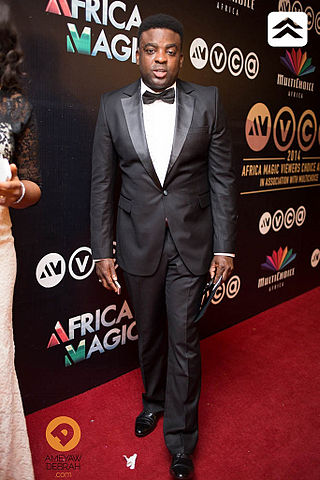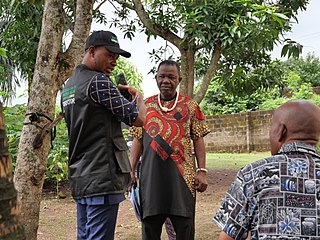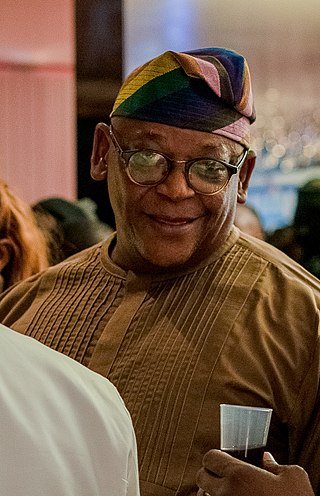
The cinema of Nigeria, often referred to informally as Nollywood, consists of films produced in Nigeria; its history dates back to as early as the late 19th century and into the colonial era in the early 20th century. The history and development of the Nigerian motion picture industry is sometimes generally classified in four main eras: the Colonial era, Golden Age era, Video film era and the emerging New Nigerian cinema era.

Richard Evans Mofe-Damijo, popularly known as RMD, is a foremost Nigerian actor, writer, producer, lawyer, and former journalist. He was also a Commissioner for Culture and Tourism in Delta State in 2009. In 2005, he won the Africa Movie Academy Award for Best Actor in a Leading Role. He received a Lifetime Achievement Award at the 12th Africa Movie Academy Awards in 2016. In 2024, he was honoured with the Industry Merit Awards, alongside Iya Rainbow at the Africa Magic Viewers' Choice Awards.

Genevieve Nnaji is a Nigerian actress, producer, and director. She won the Africa Movie Academy Award for Best Actress in a Leading Role in 2005, making her the first actor to win the award. In 2011, she was honoured as a Member of the Order of the Federal Republic by the Nigerian government for her contributions to Nollywood. Her directorial debut movie, Lionheart, is the first Netflix film from Nigeria and the first Nigerian submission for the Oscars. The movie was disqualified for having most of its dialogue in English. After having spent decades in the movie industry, she was profiled alongside some celebrities and business executives in 2020 in two new books by publisher and Editor in Chief of Yes International! magazine, Azuh Arinze.
Pascal Atuma is a Nigerian actor, director, screenwriter, and film producer, He is the CEO of TABIC Record Label. Born in Ikwuano, Umuahia, Abia State, he attended Government College, Umuahia, and further went to the University of Port Harcourt, Rivers State. He also attended KD Conservatory-College of Film & Dramatic Arts in Dallas, Texas, US, and was awarded a Certificate in Entrepreneurship Specialization from the University of Pennsylvania.
Adebayo Mosobalaje Faleti was Africa's first newscaster, Africa's first stage play director, Nigeria's first film editor and librarian with the first television station in Africa - Western Nigeria Television (WNTV), Nigeria's first Yoruba presenter on television and radio alike, a Nigerian poet, journalist, writer, Nollywood film director and actor. He was also known as a Yoruba translator, a broadcaster, TV exponent and pioneer of the first television station in Africa, Western Nigeria Television (WNTV), now known as the Nigerian Television Authority (NTA).

Osita Iheme MFR is a Nigerian actor, author, film producer and comedian known for his role as Pawpaw in Aki na Ukwa (2002) alongside Chinedu Ikedieze. Since then, he has starred in several Nollywood productions including 2 Rats (2003), Baby Police (2003), Nollywood Babylon (2008), The Mirror Boy (2011), Christmas in Miami and Aki and Pawpaw (2021). Iheme was the recipient of the 2007 Africa Movie Academy Award for Lifetime Achievement and was conferred Order of the Federal Republic (MFR), a federal honour by President Goodluck Jonathan in 2011.

The Africa Movie Academy Awards, popularly known as AMAA and The AMA Awards, are presented annually to recognize excellence among professionals working in, or non-African professionals who have contributed to, the African film industry. It was founded by Peace Anyiam-Osigwe and is run through the Africa Film Academy. The awards are aimed at honouring and promoting excellence in the African movie industry as well as uniting the African continent through arts and culture.
Kenneth Gyang is a Nigerian writer, director, and filmmaker who co-founded of the Nigerian film studio Cinema Kpatakpata. He is most well known for his 2013 comedy film Confusion Na Wa.

Kunle Afolayan is a Nigerian actor, producer and director. He is credited for elevating the quality of Nollywood movies through larger budgets, shooting on 35mm, releasing in cinemas, and improving cliché Nollywood storylines. After starting his film career as an actor in the 1999 political drama Saworoide, Afolayan made his directorial debut in 2006 with Irapada, a Nigerian supernatural thriller, which won the Africa Movie Academy Award for Best Film in an African Language. His subsequent directing credits include The Figurine, Phone Swap, October 1, and Citation.

Oludotun Baiyewu Jacobs,, known professionally as Olu Jacobs, is a veteran Nigerian actor and film executive. He began his career starring in several British television series and international films. Vanguard described him as one of the "godfathers of Nollywood", along with Pete Edochie. Trained at The Royal Academy of Dramatic Arts, England, Olu Jacobs worked with various repertoire theatres in Britain and starred in some international movies.
Koby Maxwell, is a Ghanaian musician, singer, actor and producer who currently resides in Washington, D.C. in the United States. He says that his goal is to maintain the authenticity of African music, while incorporating the sounds of others. In June 2010, he became a film producer and executive producer when he hired a US film production company to produce his first Nollywood feature film, entitled Paparazzi Eye in the Dark.

Chiwetalu Agu is a Nigerian actor. He won the 2012 Nollywood award for 'best actor in indigenous movie '. His usage of specific language slangs, phrases or clichés in many films has made him uniquely a household name in Nigeria and among Nollywood fans in general. While asserting that comic genres is a unique vehicle in projecting Nigerian culture globally as well as establishing the Nollywood brand, Agu is listed as one of the outstanding comedians who have contributed to the development of Nollywood comic genres by Prof. Femi Shaka of the University of Port Harcourt. Agu is married to Nkechi and has three sons and two daughters.
Michelle Bello is a British Nigerian film director and film producer. She is also CEO of a Nigerian-based entertainment and publishing company, Blu Star Entertainment Limited. Bello was born in London, England.

Tunde Kelani, popularly known as TK, is a Nigerian filmmaker. In a career spanning more than four decades, TK specialises in producing movies that promote Nigeria's rich cultural heritage and have a root in documentation, archiving, education, entertainment and promotion of the culture.

Samuel Dedetoku, popularly known by his stage name Sam Dede, is a Nigerian veteran actor, director, politician and lecturer. Sam Dede as he is widely known in movies studied Theatre Arts at the University of Port Harcourt.

Nollywood, a portmanteau of Nigeria and Hollywood, is a sobriquet that originally referred to the Nigerian film industry. The origin of the term goes back to the early 2000s, traced to an article in The New York Times. Due to the history of evolving meanings and contexts, there is no clear or agreed-upon definition for the term, which has made it a subject of several controversies.
Chief Enyinna Nwigwe is a Nigerian actor, producer, and entrepreneur. He is best known for playing Nonso in The Wedding Party 2, and playing Tamuno in Black November.

Keppy EkpenyongEdet Bassey-Inyang is a Nigerian actor who received a commendation award from the Actors Guild of Nigeria in 2018 for his contributions to Nollywood.

Kelechi Eke is a Nigerian film director. He is the founder of The African Film Festival (TAFF), founder of Village Arts & Film Festival (VILLAFFEST), and the creator of African streaming service, Rootflix. During the coronation in December 2023, he was installed into a chieftaincy role as the "Ichie Ihemba" of Imerienwe in the Imo State of Nigeria.












